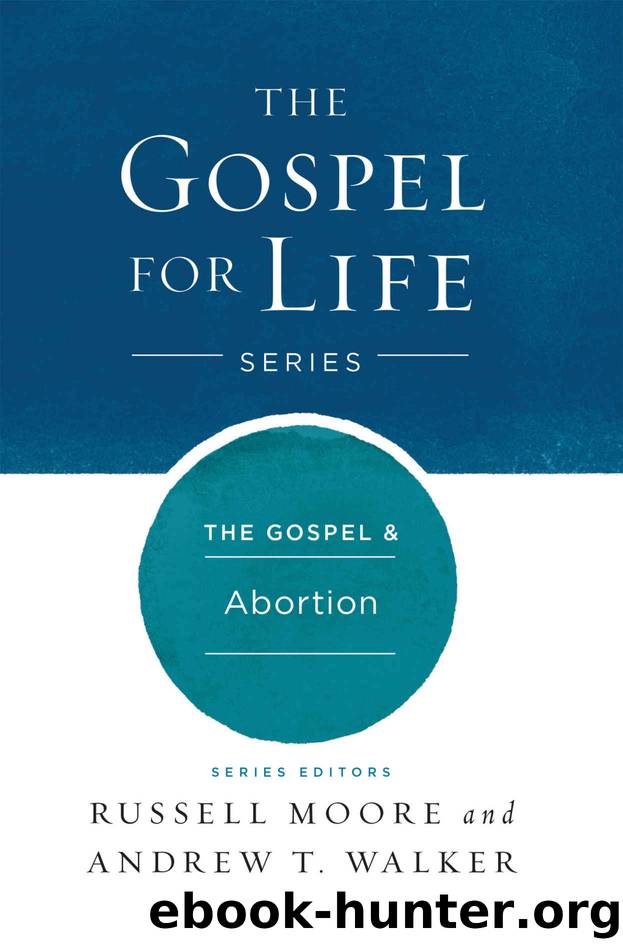The Gospel & Abortion by Moore Russell D. & Walker Andrew

Author:Moore, Russell D. & Walker, Andrew
Language: eng
Format: epub
Tags: Religion/Christian Life/Social Issues
Publisher: B&H Books
Published: 2016-12-15T00:00:00+00:00
Chapter
How Should the Church Engage?
Charmaine Crouse Yoest
EMMA BECK WAS A YOUNG ENGLISH ARTIST, PREGNANT WITH twins. She was living with Ben, the father of the babies, but he âreacted badlyâ to the news of her pregnancy, and they broke up. In a sordidly common tale, Emma felt pressured to abort the twins. After canceling her first appointment, she eventually went through with the abortion. She never got over that traumatic decision, and less than a year later, on the eve of her birthday, Emma hung herself.42
In the suicide note she left, Emma made it clear that the abortion was a source of unresolvable grief for her,
Living is hell for me. I should never have had an abortion . . . I was frightened, now it is too late. I died when my babies died. I want to be with my babiesâthey need me, no one else does.
At the inquest, the coroner, Dr. Carlyon concluded: âIt is clear that the termination of pregnancy can have a profound effect on a womanâs life.â This statement does seem self-evidently true. But it is not widely accepted as true by everyone, and in fact is actively contested by abortion proponents.
As we consider how the local church should engage the culture on abortion, itâs important to start with what abortion actually is. We canât answer how we engage, until we deeply understand why we as local congregations are called to engage.
Many believersâeven the most faithful among usâshy away from the abortion controversy, feeling discomfort with the contentiousness surrounding the discussion, often consigning it to a frame of âpolitics,â which carries with it the whiff of spiritual illegitimacy. Wanting to avoid being âpoliticalâ and âjudgmental,â some churches just sidestep the issue entirely, or hermetically seal it inside a box marked âActivism.â But leaving the abortion issue to the politically-minded subset within our church who want to organize a bus to attend the annual March for Life, and thereby checking it off the list, misses the imperative to engage holistically and meaningfully with one of the most spiritually significant evils of our day. To treat abortion as a âpolitical issueâ ignores the scope of what the life and culture of a local church can do to be salt and light in their community. This mistake is rooted in a fundamental misunderstanding of the reality of abortion.
Despite more than forty years of cultural conflict and conversation, we are still dramatically divided over the ontology of abortion. In fact, perhaps at no other time since the Roe v. Wade decision establishing the legality of abortion has the debate over the procedure itself been so focused on its nature and definition. Throughout the â80s and â90s abortion rights advocates centered their arguments on âprivacyâ and âchoice.â But as those words grew tired, and with the surge in political power brought by the Obama Administration, abortion advocates changed their tactics and their vernacular and initiated a new campaign: the objective became defining abortion as fundamental health care, no different from any other surgical procedure.
Download
This site does not store any files on its server. We only index and link to content provided by other sites. Please contact the content providers to delete copyright contents if any and email us, we'll remove relevant links or contents immediately.
The Lost Art of Listening by Michael P. Nichols(7506)
Why I Am Not A Calvinist by Dr. Peter S. Ruckman(4153)
The Rosicrucians by Christopher McIntosh(3521)
Wicca: a guide for the solitary practitioner by Scott Cunningham(3179)
Signature in the Cell: DNA and the Evidence for Intelligent Design by Stephen C. Meyer(3138)
Real Sex by Lauren F. Winner(3023)
The Holy Spirit by Billy Graham(2953)
To Light a Sacred Flame by Silver RavenWolf(2824)
The End of Faith by Sam Harris(2742)
The Gnostic Gospels by Pagels Elaine(2532)
Waking Up by Sam Harris(2461)
Nine Parts of Desire by Geraldine Brooks(2370)
Jesus by Paul Johnson(2363)
Devil, The by Almond Philip C(2333)
The God delusion by Richard Dawkins(2309)
Heavens on Earth by Michael Shermer(2285)
Kundalini by Gopi Krishna(2185)
Chosen by God by R. C. Sproul(2165)
The Nature of Consciousness by Rupert Spira(2108)
